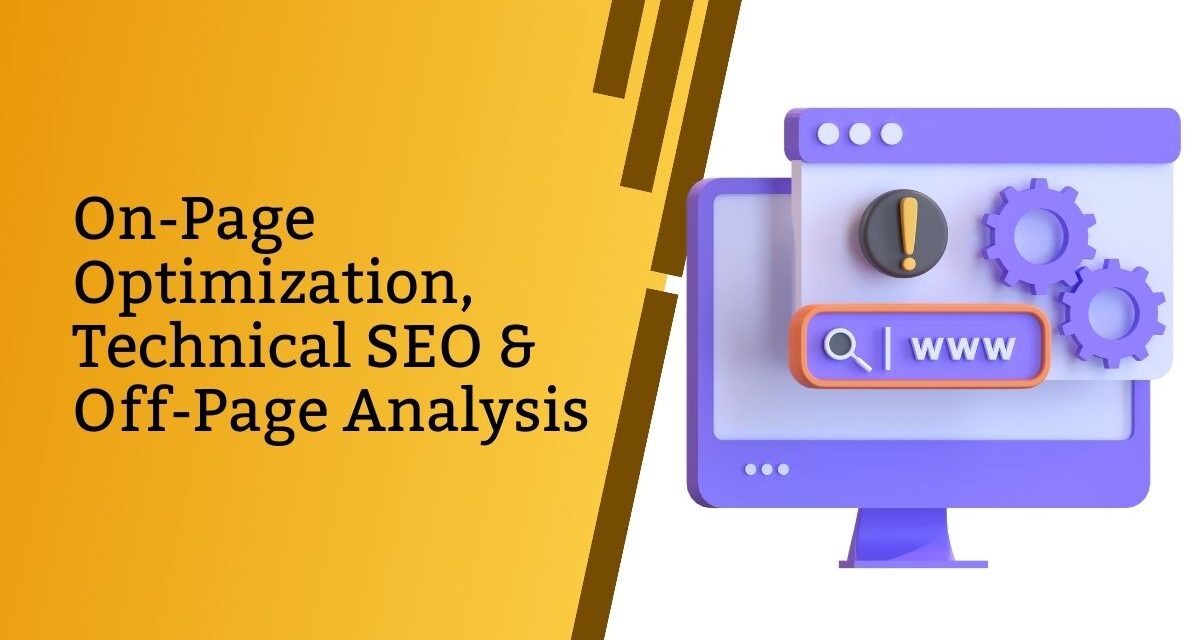A Holistic Approach to SEO
In the digital realm, where the competition for online visibility is fierce, understanding and implementing various SEO strategies are paramount for website success. This article will explore the three key pillars of Search Engine Optimization (SEO): On-Page Optimization, Technical SEO, and Off-Page Analysis. We will delve into each of these areas to understand how they collectively contribute to a website’s ranking and online presence.
What is On-Page Optimization?
Importance of On-Page SEO
On-Page Optimization refers to the process of optimizing individual web pages to rank higher in search engine results pages (SERPs) and earn more relevant traffic. It involves optimizing content, meta tags, images, and other on-page elements. The importance of On-Page SEO cannot be overstated. It directly influences how search engines perceive your content and its relevance to search queries.
Key Elements of On-Page Optimization
- Quality Content: Producing informative, engaging, and unique content is the foundation of On-Page SEO.
- Title Tags: Crafting descriptive and keyword-rich titles for your pages.
- Meta Descriptions: Writing compelling meta descriptions to entice users to click.
- Keyword Optimization: Strategically placing keywords within your content.
- Header Tags: Using H1, H2, and H3 tags to structure content.
- Image Optimization: Optimizing images for faster loading and better user experience.
Technical SEO Explained
Site Speed and Performance
Technical SEO focuses on the non-content elements of your website. Site speed and performance are critical factors for both user experience and search engine rankings. A faster website provides a better user experience and is favored by search engines.
Mobile Friendliness
With the increasing use of mobile devices, it’s essential to ensure that your website is mobile-friendly. Google gives preference to mobile-friendly websites in its rankings.
Site Structure and URL Optimization
A well-structured website with clean, user-friendly URLs is more likely to rank higher. Consider implementing a clear navigation structure and optimizing your URLs for SEO.
Schema Markup
Using structured data markup (schema) can enhance how your content appears in search results. It helps search engines understand the content and display rich snippets, which can improve click-through rates.
The Role of Off-Page Analysis
Backlinks and Their Significance
Off-Page SEO involves external factors that impact your website’s authority and trustworthiness. Backlinks play a vital role in this regard. Quality backlinks from authoritative websites can boost your site’s credibility in the eyes of search engines.
Social Signals
Social media engagement and mentions can indirectly influence your SEO efforts. An active social presence can drive traffic to your site and enhance your online reputation.
Competitor Analysis
Studying your competitors can reveal opportunities and weaknesses in your SEO strategy. Analyzing their backlink profiles and content strategies can provide valuable insights.
Combining On-Page and Off-Page Strategies
To achieve the best results in SEO, it’s crucial to combine On-Page and Off-Page strategies. This holistic approach creates a comprehensive SEO plan that maximizes your website’s potential.
Measuring SEO Success
Using Analytics Tools
Measuring the success of your SEO efforts requires the use of analytics tools like Google Analytics and Google Search Console. These tools provide valuable data on website traffic, user behavior, and keyword rankings.
Monitoring Keyword Rankings
Tracking your keyword rankings over time helps you gauge the effectiveness of your SEO strategy. Consistently improving rankings for relevant keywords is a sign of success.
Common On-Page and Off-Page Mistakes
In the world of SEO, mistakes can hinder your progress. Common errors include keyword stuffing, low-quality backlinks, and neglecting technical SEO. Recognizing and rectifying these mistakes is crucial for long-term success.
SEO Trends and the Future
The SEO landscape is continually evolving. Staying updated with the latest trends, such as voice search optimization and AI-driven SEO, can give you a competitive edge in the digital world.
Conclusion
In conclusion, On-Page Optimization, Technical SEO, and Off-Page Analysis are integral parts of a successful SEO strategy. Implementing these elements effectively can significantly enhance your website’s visibility and organic traffic. Remember, SEO is an ongoing process that requires dedication and adaptation to stay ahead in the ever-changing digital landscape.
FAQs
1. What is the primary goal of On-Page Optimization?
The primary goal of On-Page Optimization is to make individual web pages more appealing to search engines and users by optimizing content and on-page elements.
2. How can I improve my website’s site speed and performance?
Improving site speed and performance involves techniques like optimizing images, using a content delivery network (CDN), and reducing server response times.
3. What are quality backlinks, and why are they important for Off-Page SEO?
Quality backlinks are links from authoritative and reputable websites. They are essential for Off-Page SEO because they enhance a website’s authority and trustworthiness in the eyes of search engines.
4. How often should I monitor my keyword rankings?
Regular monitoring of keyword rankings is advisable, typically on a weekly or monthly basis, to track the effectiveness of your SEO efforts and make necessary adjustments.
5. What are some emerging SEO trends to watch for in the near future?
Some emerging SEO trends include voice search optimization, AI-driven SEO strategies, and a stronger emphasis on user experience and mobile-friendliness. Stay updated to stay ahead in SEO.





